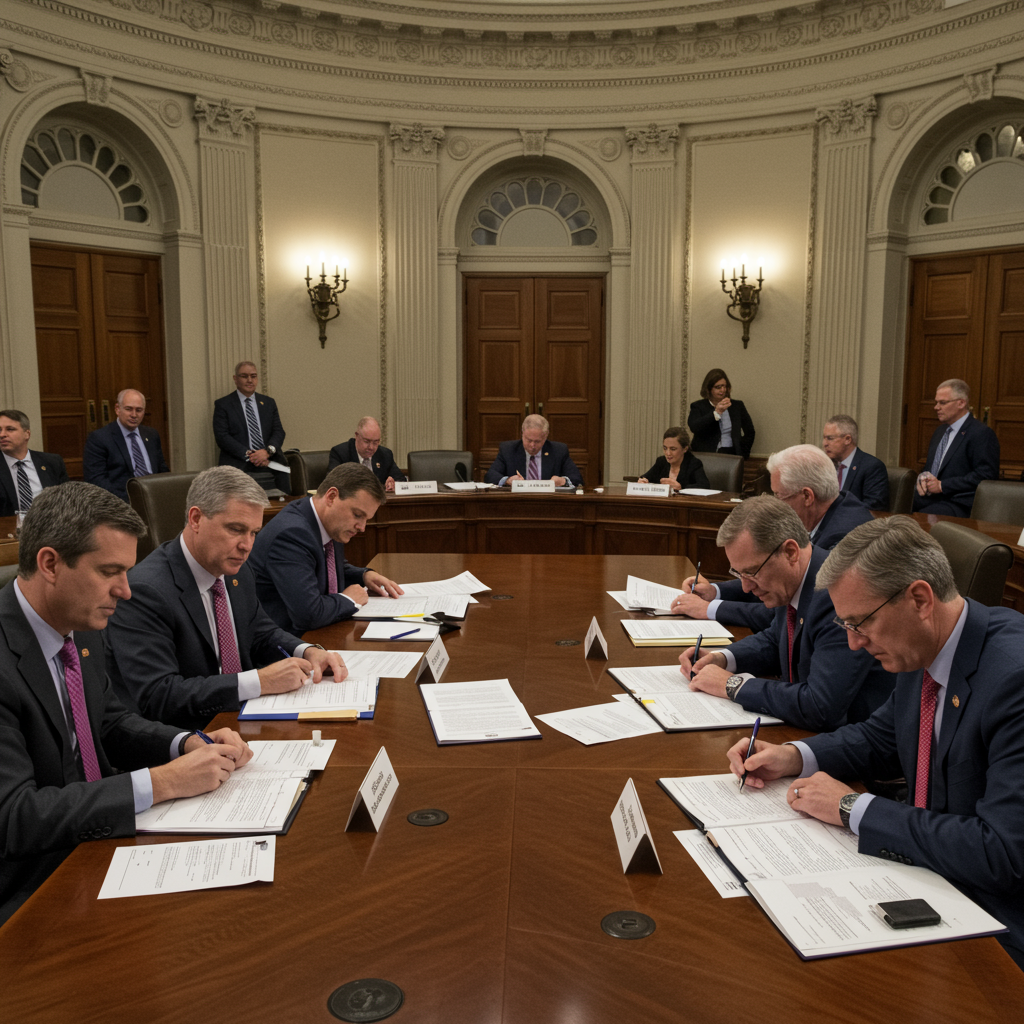In a significant move on Capitol Hill, house Republicans are pushing forward with major legislation that appears to intentionally disregard a strict budget framework they previously agreed upon. This strategic maneuver highlights the often-complex and politically charged nature of crafting large spending and tax packages in Congress. Despite concerns from fiscal conservatives within the party, leadership is employing procedural tactics to ensure the bill’s passage, demonstrating the power of a simple majority in the House to override prior commitments.
The legislation at the heart of this debate is a sprawling domestic policy and tax bill, often referred to as a “megabill,” that recently passed the Senate. While House Republicans had painstakingly negotiated a budget deal earlier in the spring – one designed to tie tax cuts directly to spending reductions – the Senate’s version of the bill introduced substantial changes that violate this agreement. This presents a direct challenge to the fiscal discipline advocated by some House members.
Violating the Hard-Won Budget Framework
Months of intense negotiations involving the House Freedom Caucus, fiscal hawks on the House Budget Committee, and Republican leadership culminated in a budget framework intended to guide future spending and tax policy. A key component, championed by figures like Rep. Lloyd Smucker, was a mechanism ensuring that any tax cuts included in major legislation would be offset by an equivalent amount of spending cuts. This was seen as a crucial step towards reining in the national debt.
However, the bill arriving from the Senate reportedly deviates significantly from this principle. Analysis, such as that conducted by Andrew Lautz at the Bipartisan Policy Center, indicates the Senate version added a substantial amount of new tax cuts compared to the House-passed bill. Initial estimates suggested an increase of $560 billion in tax reductions. Further amendments made on the Senate floor reportedly compounded the issue, adding another $20 billion in revenue cuts while simultaneously increasing spending by $90 billion. This combined effect creates a considerable fiscal imbalance that contravenes the House GOP’s negotiated framework.
The Procedural End Run
Under standard House procedure, any member can raise a “point of order” if legislation violates established rules, including budgetary limits or frameworks. Such a challenge would typically require a vote to waive the rule being violated. In the Senate, waiving a budgetary point of order often requires a three-fifths majority (60 votes), providing significant protection for fiscal rules. The House operates differently. A budgetary point of order can be waived with a simple majority vote (218 votes if all members are present), making it easier for the majority party to overcome procedural hurdles.
However, in this instance, House Republican leadership is taking steps to avoid even a simple majority vote specifically on the budget violation itself. Instead of allowing a standalone vote on waiving the point of order, they are embedding this waiver directly into the “rule” for floor debate. The rule is the procedural motion that dictates how a bill will be considered, including debate time and which amendments are allowed. By stipulating that the bill is to be considered “without intervention of any point of order” within this rule, leadership effectively neutralizes any challenge based on the budget framework violation before debate even begins.
This approach prevents fiscal conservatives from forcing a public vote that would explicitly demonstrate how the party is abandoning its own budget agreement. Passing the rule requires only a simple majority, and Republicans are asking members to approve this rule, thereby preemptively silencing potential procedural objections.
The Intense Political Struggle for Votes
Despite the procedural pathway available, securing the necessary votes for the “rule” proved to be a major challenge for House leadership. The external research highlights the intense, hours-long struggle to gather sufficient Republican support, pushing procedural votes to historic lengths. With only a slim majority, House Republicans could afford only a few defections if all members were present. This dynamic amplified the power of even a small group of holdouts.
Conservative members, particularly within the House Freedom Caucus, voiced significant opposition. Figures like Reps. Ralph Norman and Chip Roy voted against advancing the bill in the Rules Committee. Rep. Thomas Massie remained a consistent opponent, citing concerns about the bill’s potential to increase the deficit. Some, like Rep. Victoria Spartz, explicitly stated their planned opposition to the rule due to perceived broken commitments on fiscal frameworks, noting the Senate version’s substantial violation potentially exceeding half a trillion dollars.
Leadership, including Speaker Mike Johnson, and former President Trump engaged heavily in efforts to sway undecided and opposing Republicans. Meetings and conversations, including direct intervention from Trump, were crucial in shifting votes. Proponents framed the bill as delivering “major wins” on issues like border security, tax policy, and work requirements for welfare programs, arguing that while not “perfect,” it represented the “best we’ll get.” Some members, previously opposed, publicly changed their stance after meeting with Trump, illustrating the significant influence he wields within the party.
Diverse Stakeholder Perspectives
The bill has drawn a sharp contrast in reactions across the political spectrum. Republican proponents, often echoing Trump’s framing, emphasize the bill’s potential for economic growth through tax cuts and inclusion of key conservative priorities. They view the procedural maneuvering as necessary to advance important policy goals despite internal disagreements on fiscal details.
Democratic leaders, conversely, have vowed strong opposition. They characterize the bill as “cruel,” rushed for passage, and harmful to working families. Their arguments center on accusations that the bill represents a massive transfer of wealth to the wealthy, makes Americans “sicker and poorer” through cuts to healthcare programs, and takes food from vulnerable populations by targeting SNAP benefits. They view the procedural tactics as an attempt to push through unpopular legislation without proper scrutiny.
Implications and Moving Forward
The decision by House Republican leadership to bypass their own budget framework through a procedural rule underscores the practical realities of governing with a narrow majority. While it allows them to advance priority legislation despite internal divisions, it comes at a cost. It alienates fiscal conservatives who prioritized deficit reduction and adherence to the negotiated framework. It also provides political ammunition to opponents who can point to the party’s apparent disregard for its own stated fiscal principles.
This episode highlights the tension between ideological commitments and the pragmatic need to pass legislation. By prioritizing the policy contents of the Senate bill and the political imperative to deliver a legislative victory, leadership is accepting a rift with a segment of their conference. The use of the rule to waive points of order is a powerful tool available to the House majority, but its application here reveals the depth of the challenges in uniting the Republican conference behind a complex “megabill” that carries significant fiscal implications.
Frequently Asked Questions
What is a “point of order” in the House and how is it relevant here?
A point of order is a procedural challenge raised by a member claiming that the rules of the House are being violated by the current proceedings or legislation. In this case, a point of order could be raised arguing that the bill violates the House Republicans’ budget framework agreement regarding the balance of tax cuts and spending cuts. Normally, waiving such a point of order requires a vote, but leadership is preventing this by including a waiver directly in the rule governing the bill’s debate.
Why are some House Republicans opposing their party’s budget bill?
Some House Republicans, particularly fiscal conservatives and members of the Freedom Caucus, are opposing the bill because they believe it violates the party’s previously agreed-upon budget framework. They argue the Senate version includes too many tax cuts without sufficient spending cuts, potentially adding to the national deficit. Groups like the Bipartisan Policy Center have highlighted the significant fiscal deviation from the House’s original plan. These members feel that bypassing the budget framework reneges on commitments made during earlier negotiations.
How does the rule for floor debate bypass the budget objections?
The “rule” is the procedural motion that sets the terms for considering a bill on the House floor. House Republican leadership is including language in this specific rule that states the bill is to be considered “without intervention of any point of order.” This means that even if a member tries to raise a point of order based on the budget framework violation, that challenge will not be recognized or voted upon because the rule itself has preemptively waived all such objections for this specific bill.
The political maneuvering around this bill underscores the constant tension between policy goals, fiscal responsibility, and the realities of coalition building and vote counting in the legislative process.


